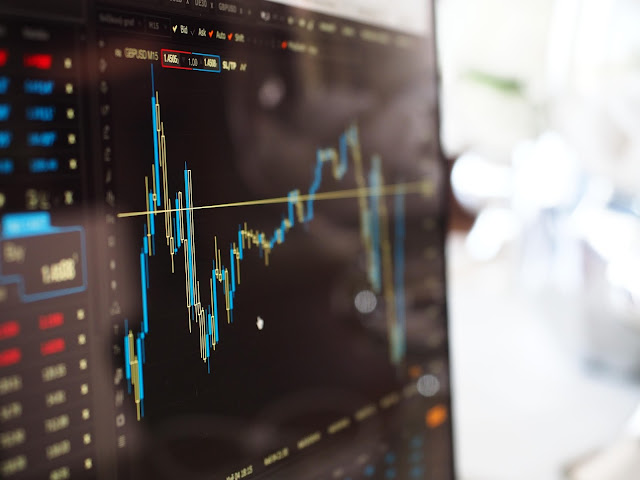Japan's a likely target if it all kicks off, right ? And it's plainly in range ..... so why is the Japanese Yen such a "safe-haven" ? ref :- "Here's why the yen remains a safe haven after a rocket passes over Japan" , Bloomberg Markets
Actually, if anything things are a bit
calmer this morning ..... the market has taken Mr Trump's "All options
open" comment as a restrained response to N. Korea's highly provocative
missile launch early yesterday. By the President's own standards, they're
probably right. And Kim Jong Un's declaration that the launch was in response
to the annual joint S. Korea / US military exercises almost came as something
of a relief, given that N. Korea always likes to assert it's own
military prowess when these exercises come around. In that sense, this was
nothing unusual from this most unusual and unpredictable N. Korean leader.
Even if some might consider this to be a
somewhat rose-coloured interpretation of events, it has seen a slight pull-back
in the "Risk Off" trades that have been in demand as tensions have
escalated. All the normal "safe-havens" have been attracting
investors : Top-rated sovereign bonds, especially US Treasuries , Gold, the
Swiss Franc ..... and of course the Japanese Yen.
A question often asked is "Why is the
Yen a safe haven when Japan is the world's largest debtor nation in terms of
percentage debt-to-GDP ratio (about 250%)?" . A fair question, and the
simplest answer is that almost the entire debt is held domestically --
in other words, the Japanese government may be well in debt but the rest
of Japan's got plenty of ammunition. But the question that might be more
pertinent at this precise moment in time is "Why is the Yen a safe haven
when Japan is being threatened by a foreign leader of questionable sanity on
its doorstep with the probable capacity to deliver nuclear strikes ?"
It's probably just us, but that more
difficult question is being discussed in a number of media outlets today and
quite frankly none that we came across has managed to find an entirely convincing
answer. Essentially, the reasoning seems to be that all reasons that have made
the Jap Yen so attractive as a refuge in times of crisis still apply, and
outweigh the counter-argument presented by the geographical proximity of Japan
to N. Korea. If that's the case, then at a time of escalating threat they'd
better be pretty good reasons and it's probably sensible to remind ourselves
what they are.
Foremost amongst them is Japan's current
account surplus. More than just a measure of Japan's positive balance of trade
over a long period, it reflects the fact that the value of foreign assets built
up by Japanese investors is substantially higher than the value
of Japanese assets held by foreign investors. In fact, the so-called Net Foreign
Asset of + JY 339 trillion (end 2015) makes it the world's largest creditor
nation, a position it's held for more than 25 years. Forget the fact that it
sits rather incongruously with Japan's Debt-to-GDP ratio (not to mention it's
constant flirting with recession), this is extremely supportive of the currency
in Risk Off, flight-to-quality scenarios. In short, in times of trouble
investors tend to bring money home and such capital inflows would entail
selling of securities denominated in foreign currencies and buying of the Yen.
We're talking big numbers here ..... as of
June this year, the Japanese owned $1.09 trillion of US Treasuries alone
(second in the table after China). Such is the scale of repatriation of funds
that could occur in extremis that the Jap Yen can even strengthen
in the face of internal crises. Counter-intuitive though it seems, after the
disastrous 2011 Tohoku earthquake and tsunami the currency was actually boosted
by the expectation that insurance companies would repatriate large amounts of
foreign assets to pay for claims -- as it turned out, the
expectation of inflows was considerably outweighed the reality.
Then there's the Carry Trade ..... yep,
our old friend. Investors borrow in a low interest-rate currency --
the Japanese Yen is a big favourite -- and then sell the
currency in order to buy higher-yielding assets (or lend) in another currency.
Which is fine .... except that in Risk Off situations there's a rush to unwind
the positions -- which is to say, to sell the higher yielding asset
and repurchase the funding currency, very often the Yen. Which is a major
reason why in these stressful times, the Dollar /Jap Yen rate has become
closely correlated with the performance of US stock markets : as markets take
fright, $ / JY moves lower (i.e. the Yen strengthens).
Another factor that boosts the Yen,
something it has going for it that it's main rival as a safe-haven currency the
Swissie doesn't, is that it's undervalued. Well, to be more precise ..... there
are many methods of calculating whether a currency is over- or under- valued,
but one of the most popular is Purchasing Power Parity. By comparing the cost
of the same items in different nations, PPP will give an imperfect guide to
whether the current exchange rate is "fair value". By that measure,
the Yen is currently 7.07% UNDERvalued, while the Swiss Franc is 22.64%
OVERvalued.
Obviously the reasons for Yen strength in
"normal" times of stress are sound ..... the question for investors
is do they outweigh the geographical concerns inherent in this particular
crisis ? For the market, they plainly do .... for now. But despite the
remarkable resilience of the currency post-Tohoku in 2011, it must be open to
question whether the Yen could maintain it's safe haven status if things take
the worst possible turn in that part of the world. Let's hope it's a question
of academic interest only.



No comments